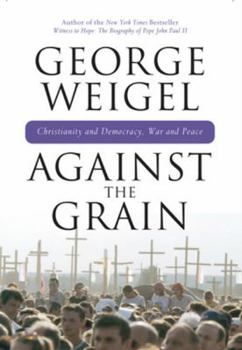Against the Grain: Chrisitanity and Democracy, War and Peace
Cutting against the grain of conventional wisdom, New York Times bestseller, George Weigel, offers a compelling look at the ways in which Catholic social teaching sheds light on the challenges of... This description may be from another edition of this product.
Format:Hardcover
Language:English
ISBN:0824524489
ISBN13:9780824524487
Release Date:April 2008
Publisher:Crossroad Publishing
Length:339 Pages
Weight:1.48 lbs.
Dimensions:1.2" x 6.4" x 9.0"
Customer Reviews
4 ratings
Buy one, and buy another for your church library
Published by Thriftbooks.com User , 15 years ago
This is not a casual read book. If you are interested, though, in deep thinking about the Church and its role in society as you form your own spiritual role in the world then by all means read this book. And, then promote it in your parish.
Must Read!
Published by Thriftbooks.com User , 16 years ago
George Weigel nails it, again. His style, and narratives make this a page-turner. If you have an interest in responsible citizenship and/or Catholic Social Teaching this is a must-have for your bookshelf.
The Elephant in the Room
Published by Thriftbooks.com User , 16 years ago
I've had very little exposure to George Weigel, but this book puts me on alert to watch for future opportunities to examine his thinking on such deep issues as the relationship between science and religion, church and state, materialism and spiritualism, Chrisitanity and secularism, etc. The issues raised in this book rise to the level of acknowledging the elephant in the room that many people do not want to discuss, not unlike the treatment that slavery got at the Constitutional Convention. The conservative and liberal commentariat would do well to abandon their superficial "food fights" for a careful examination of Weigel's Against the Grain. Failure to do so may well lead us into civil war or a new dark age. This book is an excellent primer for those who wish to rise above the simplistic monologues presented by the commentariat to, by now, a well-anesthetized community. The writing is excellent, the reasoning is tight, and the conclusions and recommendations are not simply provocative. They are worthy of broad circulation, authentic dialogue, and action to address the drift toward procedural fidelity at the expense of substantive integrity in the post-modern era.
5 for Christian wisdom, Chapters on Iraq Questionable
Published by Thriftbooks.com User , 16 years ago
This was my first exposure to this author, who has 14 other books to his credit and was for seven years president of the ethics and public policy center. The essays that comprise the book were written over the course of 15 years, generally as lectures at Catholic centers of learning excellence. Each has a current introduction and explanation of provenance. Highlights of this extraordinary work: Six big ideas: 01 Religion and its moral views are a huge part of the public dialog 02 Abortion, euthanasia, and stem-cell research destructive of embryos violate first principles. 03 Free economy empowers the poor 04 Just war tradition balances freedom, justice, & security 05 John Paul II/Second Vatican was about challenging modernity to rediscover the value of truth and love 06 Catholic Church has a "form" from Christ The author calls on reviewers to pay attention to his introduction to the book, which is indeed a very fine summary (but no substitute for a full reading). He outlines why he titled the book "Against the Grain:" 01 Political science is not just about statistics 02 Democracy is not just procedural 03 Challenges functional pacifism 04 Challenges the amorality of RealPolitic (AMEN!) 05 Asserts the inherent Christianity of America and the constant propositions (see The Thirteen American Arguments: Enduring Debates That Define and Inspire Our Country and also The Faiths of the Founding Fathers 06 Disintegration of mainline Protestantism *combined with* the abdication of universities from teaching values opened door for Catholic reflection but the door was slammed shut by the 1960's I have a note at this point that the book is an inspiring example of political theology, and am surprised at its stark conservatism. The author develops a theme throughout the book, to wit that there are three major spheres: the political, the economic, and the cultural, and that it is the Church--the Catholic Church alone among all religions in having diplomatic representation across 172 nations, that is a major player in the cultural arena while having a helpful influence on the other two spheres. At this point I am furious to discover a really crummy index, mostly names. This work is too important to allow a lazy publisher to dismiss a proper indexing job, and I recommend the author demand a proper index for the paperback edition. Unlike A Civilization of Love: What Every Catholic Can Do to Transform the World this book is "not for Catholics only," and I also find it a great deal more challenging, more substantive, more reflective. The principles of Catholic social doctrine (the author steadfastly refuses to acknowledge "liberation theology" as having standing: 01 Personalism (human rights) 02 Common good (communitarianism) 03 Subsidiarity (civil society as milieu) 04 Solidarity (civic friendship--relationships--added by John Paul II. See also Groundswell: Winning in a World Transformed by Social Technologies and Collective Intelli





